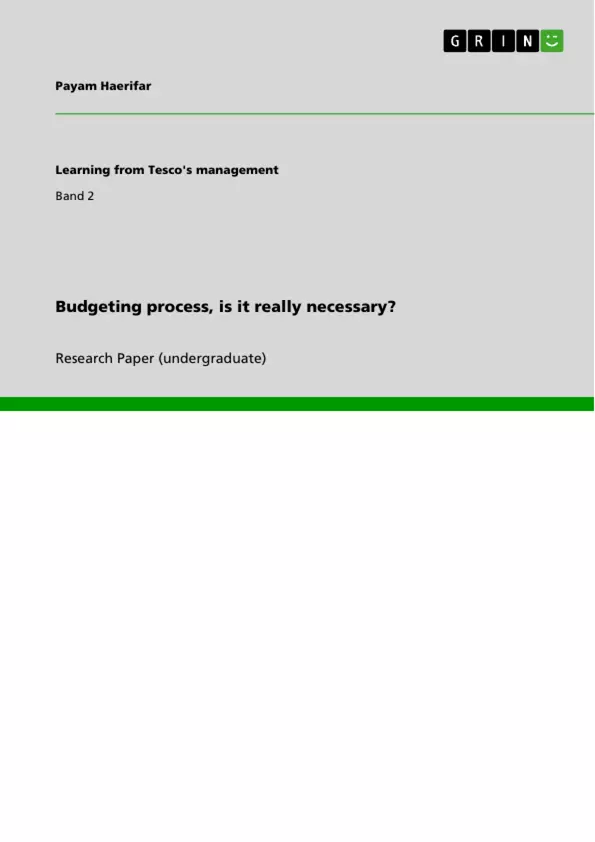The strategic planning is the long-term plan of organisations and budget is the short-term plan that contains more detail regarding to business operations. The budget is like a blueprint for entire business which is prepared for the next year. So it is designed by estimating and forecasting future trends in market. Budget is used to evaluate actual performance of a company or a section of company with desirable performance that this desirable performance is based on forecasting markets. Therefore, an excellent budget process should have this ability to convert objectives and desirable goals (it means future estimated outcomes) into data.
This statement could be wrong in some situations. Various scholars provide opposites arguments regarding to this statement. Beneath the main body these two arguments against and in favour of this above statement are discussed abundantly.
One of the main success elements of budget is finding the right resource to implement the budget calls for extensive use of human resources. But sometimes even with the appropriate and well-designed budget it is not possible to reach budget’s targets because of human resource or their misunderstanding of budget. Organisations try to have correct congruence perceptions within their employees but some researches demonstrate different outcomes (perception) may be exhibited when the individuals have not parallel objectives compare to organisational goals. These two main issues of budgeting success factors are mentioned in this writing; besides, one of the main differences between imposed budgeting and participatory budgeting is mentioned in this study. This difference is regarding to the way of communication.
Inhaltsverzeichnis (Table of Contents)
- Executive Summary
- Table of Contents
- 1. Introduction
- 1.1. What is Budgeting?
- 1.2. Origin of Budgeting and the Origin of Criticizing its Process
- 2. Main Body
- 2.1. Evaluation Critically the Statement ‘An Excellent Budget Process is the Ability to Convert Objectives and Goals into Data’
- 2.1.1. Supportive Reasons
- 2.1.2. Contradictory Reasons
- 2.2. Evaluate Critically the Statement ‘Finding the Resources to Implement the Budget Calls for Extensive Use of Human Resources and Involves Correct Perceptions of Individual Roles and Communication Play an Important Role’
- 2.2.1. Advocating
- 2.2.2. Criticising
- 2.3. Describing the Differences Between the Communication Flows When the Budgeting Process is Imposed or Participatory
- 2.1. Evaluation Critically the Statement ‘An Excellent Budget Process is the Ability to Convert Objectives and Goals into Data’
Zielsetzung und Themenschwerpunkte (Objectives and Key Themes)
This paper critically evaluates the budgeting process, examining its effectiveness and impact on organizational performance. It explores the debate surrounding the necessity of budgeting, considering both arguments for and against its implementation.
- The ability of a budget process to convert objectives and goals into quantifiable data.
- The role of human resources and communication in successful budgeting.
- The comparison of imposed versus participatory budgeting approaches.
- The potential for budgeting to incentivize unethical behavior.
- The impact of budgeting on organizational culture and employee performance.
Zusammenfassung der Kapitel (Chapter Summaries)
Chapter 1: Introduction introduces the concept of budgeting as short-term planning, contrasting it with long-term strategic planning. It defines budgeting and discusses its historical development alongside criticisms of the process.
Chapter 2: Main Body - Section 2.1: This section critically analyzes the statement that an excellent budgeting process converts objectives and goals into data. It presents arguments both supporting and contradicting this assertion, addressing the predictability of future market trends and the challenges of adapting to rapidly changing environments.
Chapter 2: Main Body - Section 2.2: This section examines the critical statement that successful budgeting requires extensive human resources, accurate perception of individual roles, and effective communication. It presents arguments for and against this claim, exploring the potential for budgeting to motivate both ethical and unethical behaviors.
Chapter 2: Main Body - Section 2.3: This section compares and contrasts imposed and participatory budgeting methods, focusing on the differences in communication flow between top management and subordinates.
Schlüsselwörter (Keywords)
Budgeting, strategic planning, organizational performance, human resources, communication, imposed budgeting, participatory budgeting, ethical behavior, goal setting, market forecasting, resource allocation.
Frequently Asked Questions
What is the difference between strategic planning and budgeting?
Strategic planning is long-term and focuses on organizational goals, while budgeting is short-term (usually one year) and provides detailed data for daily business operations.
Can a budget process truly convert goals into data?
The paper critically evaluates this statement, presenting arguments that while data is necessary, unpredictable market trends can make this conversion difficult in practice.
How do human resources affect budgeting success?
Success depends on employees' correct perception of their roles and effective communication. Misalignment between individual and organizational goals can lead to budget failure.
What is the difference between imposed and participatory budgeting?
Imposed budgeting is top-down (management to subordinates), while participatory budgeting involves employees in the goal-setting process, which can improve motivation and communication flow.
Can budgeting lead to unethical behavior?
Yes, the paper discusses how rigid budget targets might incentivize employees to manipulate data or engage in unethical actions to meet desirable performance metrics.
- Arbeit zitieren
- MBA Payam Haerifar (Autor:in), 2012, Budgeting process, is it really necessary?, München, GRIN Verlag, https://www.grin.com/document/187174



